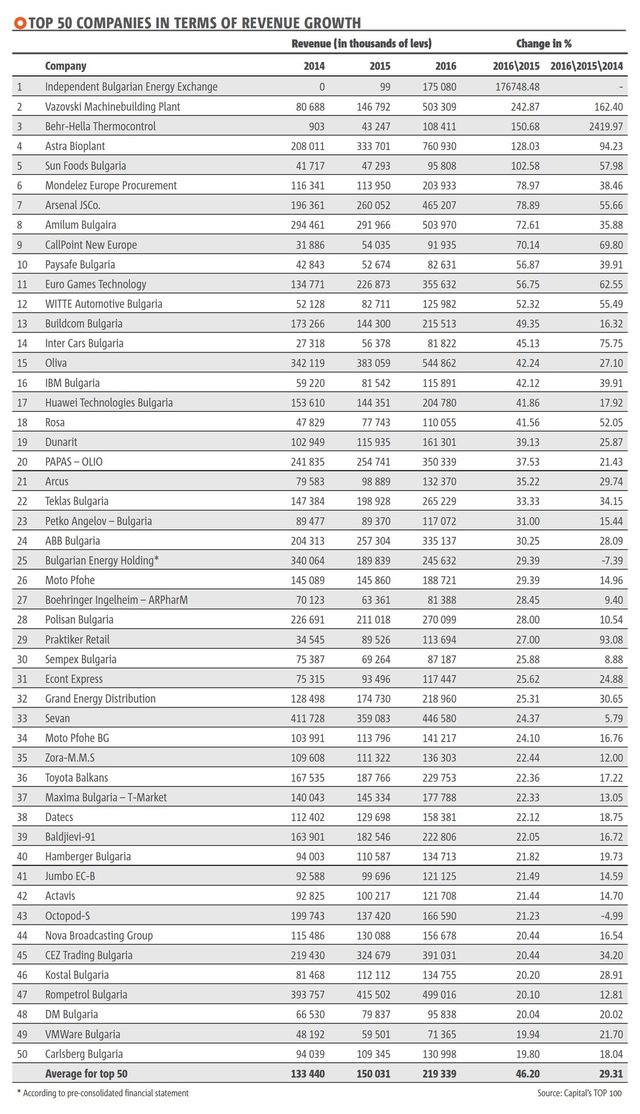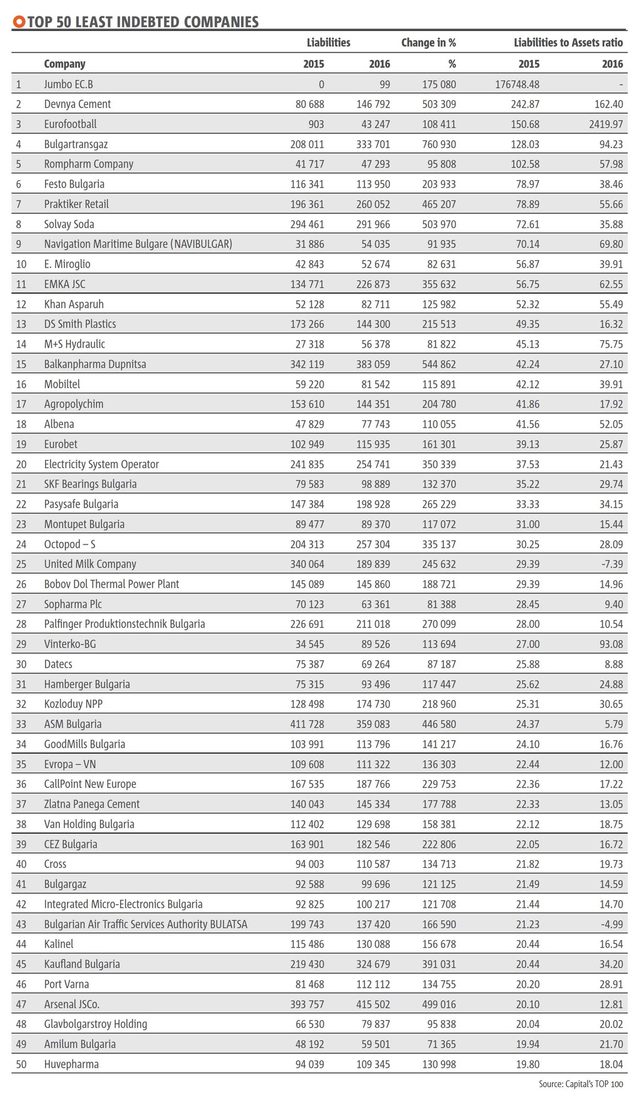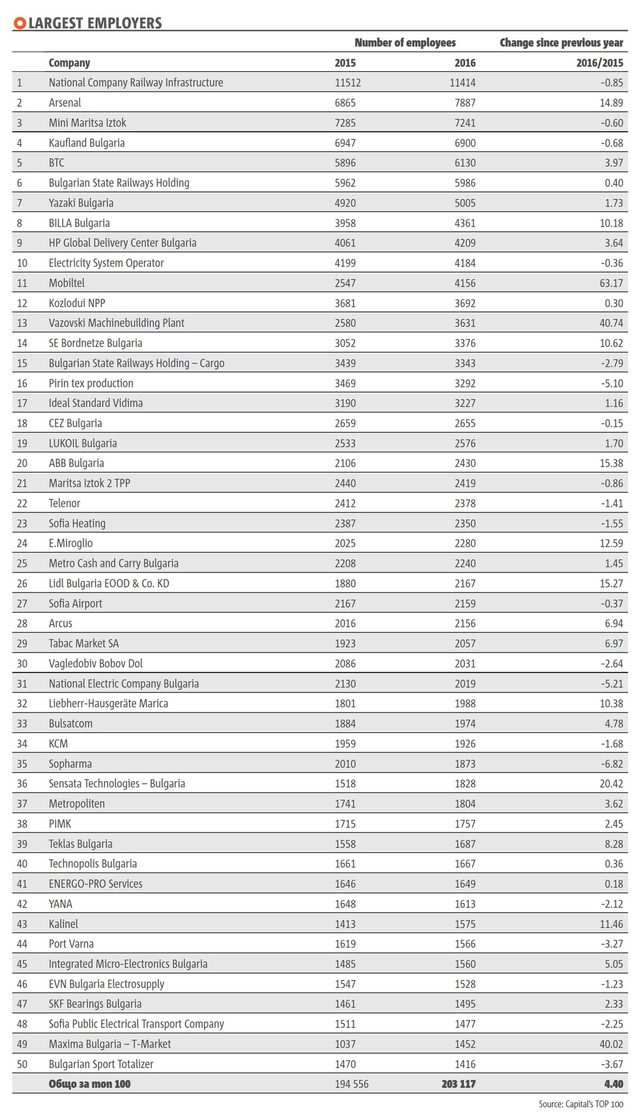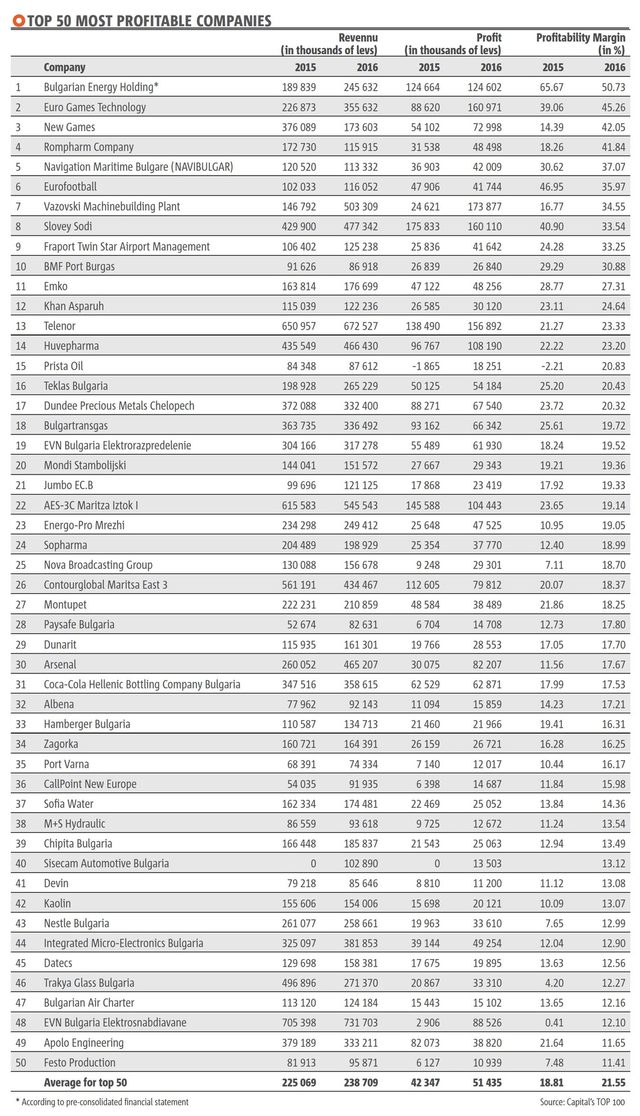• The combined profit of the top 100 companies by revenue grew by 21% to 1.3 bln euro in 2016.
It might come as a surprise, but the combined result of the top 100 companies by revenue in Bulgaria fell by 1.65% in 2016. Why is there a drop, given the overall growth of the economy, exports, employment and income? The reason for this counterintuitive result lies in the global economic environment: there are many companies in the fuel and metals sectors which suffered from lower international prices last year. If the revenues of the representatives of these two sectors and the energy companies are excluded, the revenue of the remaining ⅔ of the companies in the TOP 100 grew by 3%, i.e. as much as the economy.
The picture is quite similar among the companies with revenues of between 100 and 35 mln euro. Without the construction companies, which suffered from a lack of government orders, and the firms which depend on exports of raw materials, the rest of the 300 biggest Bulgarian companies grew 6.3% year-on-year.
The growing ones
The industries, in which we observe the largest increase in revenue, are from the sectors of machine building, technology and food. For a second year in a row, the five arms factories' revenue and profits are rising significantly. The tourism industry is growing as well, but there is only one company from the sector in the top 300 - Albena, and the reason is that the hotel business is still spread among a lot of small and medium-sized enterprises.
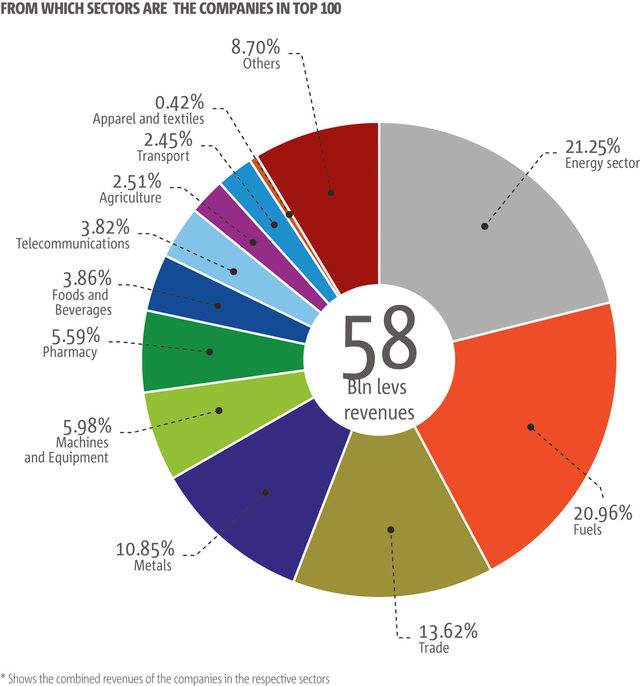
A breath of fresh air comes from the software companies which are joining the 'big guys club'. Paysafe is making a debut in the ranking with its 43 mln. euro revenue. Although the long-term leader Telerik is being narrowly surpassed, it is still in the upper ranks of the biggest companies in Bulgaria. The software sector has one more representative in the TOP 300 - VMWare.
Some other interesting debuts include the new state energy exchange which has sold energy for over 87 mln euro. Rousse-based biodiesel factory Astra Bioplant, has a revenue of over 380 mln euro ranking it as 13th largest company in Bulgaria. Sunflower oil producer Oliva, which produces almost exclusively for export, has achieved an incredible rise in revenue to over 275 mln eurofrom 193 in 2015. A bit more exotic member of this group is gambling equipment manufacturer Euro Games Technology, which posted 180 mln euro revenue.
Of the top 300 companies, 84% posted profit, and 12% closed 2016 with a loss. These are the best results since the financial crisis. For example, 29 companies from the top 100 ranking closed 2014 with a loss.
Even the Lukoil Neftohim refinery in Burgas, which usually reports end-year loss, had a profit of almost 60 mln euro. The largest profit was achieved by Aurubis' copper plant - almost 100 mln euro.
...andthe shrinking ones
The construction business posted the most serious decline in revenueafter the companies from the sectors of fuels, metals and electricity. The revenue of the big companies in the sector fell by 35% on average. The main reason was that there wereno large infrastructure projects financed with EU money, like highways or water infrastructure projects.
Technomarket, a retailer of electrical appliances, saw its revenue drop by 36%. Over the past year, the glass factories of Turkey's Sisecam in Bulgaria split into three separate companies, that is why the decrease in Trakia Glass' revenue is not indicative of the group's overall performance in the country, which is actually growing.
The three entrants with the biggest fall in revenue are the state-run National Electricity Company and National Railway Infrastructure Company and a municipal one - Toplofikatsia Sofia, the city's district heating utility).
Hirings on the rise
When you look at the numbers of workers in the top 100 biggest employers in the country, the year seems good as well. The increase in hired personnel is 4% which is slightly better than in the previous two years. The top 100 companies with the largest number of employees created over 8,500 new jobs in 2016. The main driver was the rise in export demand, but there was growth in some companies working for the domestic market as well.
The future is bright
This year has begun on a positive note: the economy is growing, exports and salaries are rising. In this environment and with inflation back, 2017 will most probably be a lot better for the companies' revenues. The 19 companies, which were interviewed, also gave positive forecasts for their results this year. Among them, 16 expect the same or higher profits in 2017.
The 50 most dynamic companies out of the top 300 businesses in Bulgaria increased their earnings by 46% on average in 2016. What's notable is that middle sized firms with turnover of between 35-100 mln euro grow the most, whereas the large corporations show moderate growth. The sectors most widely represented in this group are the producers of machinery and equipment, as well as agricultural and food companies, retail chains and arms manufacturers. The processes that had driven the growth of these sectors are both internal (energy market liberalization and absorption of funds in the first program period of the current seven year framework) and external (low fuel and raw materials costs). The most dynamic companies are located in the sector of electricity trading, they receive state backing and participate in the Bulgarian energy exchange launched in 2016. There are also cases of revival due to increased international demand for specific products and services, as in the case of the four large weapon producers in Bulgaria. Although the top 50 most dynamic companies demonstrate steady growth, they are still making less revenue (5.5 bln euro annually) compared with the peak period for the same group in 2012, when their combined revenue totaled 9.75 bln euro (see p.57).
Top companies in Bulgaria remain conservative borrowers, yet the state energy sector keeps on taking out large loans to cover the liabilities of the power plants in the country. The indebtedness of the top 300 companies in 2016 stands at 27.5 bln euro, yet if one takes out the new debt incurred by the National Electricity Company and the Bulgarian Energy Holding, the rest of the companies decrease their combined debt. The liabilities in the state energy firms arise from the need to repay the money they owe to the US-based owners of two coal-fired power plants, which, in turn, need to cover their own dues to the state-owned Mini Mariza Iztok lignite mines. The rest of the least-indebted companies show low appetite for taking on new debt, which shows fiscal conservatism, but hinders their potential for expansion. Outside the energy sector, the average indebtedness of the top 50 companies had actually decreased by 11.13% compared to 2015.
This tendency can be explained with the freezing of the credit market in the banking sector, despite the better credit conditions offered. Unlike other rankings, there are no clear patterns which sectors take on more or less debt (see p.58).
Gambling, arms and, last but not least, the automotive and chemical industries which generate high added value, are the most profitable sectors in the Bulgarian economy. They contributed 21.4 euro cents of every euro of sales in 2016, almost
as much as the year before. The sustained growth is due to the rise in arms sales to the conflict zones in the Middle East and North Africa - one-third of the growth in sales comes from the recent resurgence of state-owned arms makers like VMZ. The biggest Bulgarian weapons manufacturer increased its profit sevenfold to 86.5 mn euro in 2016 and employed twice as many people compared with 2015 - 4318. These results resonate, although to a lesser degree, in the rest of the large state-owned weapon companies. The other booming sector is gambling, which is no longer dominated solely by Vasil Bozhkov's Eurofootball and New Games, that made 37 mn euro profi t in 2016. The new player in town is Euro Games Technologies with 80.5 mn euro profi t. The companies in the pharmaceutical sector and the automobile parts manufacturers like Turkey's Teklas are growing steadily, although not as much as the arms industry. The recent revival of the global economy and the strong tourism season last year boosted the profi ts of transport and logistics companies as well (see p.60).
• The combined profit of the top 100 companies by revenue grew by 21% to 1.3 bln euro in 2016.
It might come as a surprise, but the combined result of the top 100 companies by revenue in Bulgaria fell by 1.65% in 2016. Why is there a drop, given the overall growth of the economy, exports, employment and income? The reason for this counterintuitive result lies in the global economic environment: there are many companies in the fuel and metals sectors which suffered from lower international prices last year. If the revenues of the representatives of these two sectors and the energy companies are excluded, the revenue of the remaining ⅔ of the companies in the TOP 100 grew by 3%, i.e. as much as the economy.









